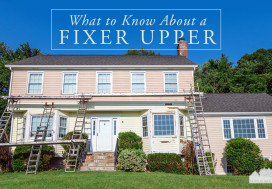
If you like the old home feel, prefer doing things with your hands, and are generally a crafty person, renovating and old home might be something you’ve considered accomplishing. The notion is an attractive one since you can likely find an older home for under market value. So what should you do if you’ve found a home calling your name, but it is in need of some love and upgrades? Tackling a fixer-upper home can be a time-consuming, but rewarding, project. Consider this advice for purchasing a fixer-upper home to help you get started.
Think about affordability.
Sure, the fixer-upper you found might be well within your budget as it is, but don’t forget to include the cost of renovation. If the house needs simple repairs like ones you can do yourself, then the expenses involved in renovation might remain within your budget or, if you are flexible, go over a little bit more. If the house needs complex repairs like landscaping, major replacements like air conditioning and heating, septic, ventilation, additions like decks and patios or fixing problems like mold and leaks, you made need to do some rethinking. This kind of work can be pricey, and if you can’t afford to do it out-of-pocket or with financing—like a renovation loan, then you could have trouble down the road.
Think about what you can do yourself.
Repainting interiors or exteriors, replacing windows and doors, installing ceiling fixtures like lights and fans, and refinishing floors and carpet are just a few examples of renovation projects you can probably do yourself. Roll up your sleeves and get to it! The more skills you have that can help you fixing up the house, the fewer projects you’ll need to pay others to do.
Something else to consider is time. Even if you can do all or most of the home renovations yourself or can afford bringing in a third party, you may not have the time to keep up with the project because of other responsibilities, like work.
Think about home inspection.
Before you purchase a fixer-upper home, don’t eyeball it and think, “Yep. This’ll do.” The house may have hidden problems you can’t see immediately, and these hidden problems may put a hamper on its affordability. Hire someone certified in home inspection so they can tell you if you have a leak under the cabinets, a pest problem, mold growing or lead in your paint, and any number of other issues requiring a closer, trained-eye look. At that point, you or the seller will have the option to back out of the deal, have the seller perform repairs, or the seller can pay you for the repairs.
Think about permits.
Some of your home improvements may require permits, like making structural changes to the house, building a deck or fence, adding or remodeling the house, etc. You can rely on your contract to get these permits in order, or you can do it yourself: just know that acquiring permits can be a long, arduous process that is integral to the work you do on your fixer upper. Painting, replacing a faucet, and changing carpet are example of work that doesn’t require a permit. If you aren’t sure, consult a professional.
Think ahead.
Not just financially but about issues you may not expect initially going in. The home inspector may have missed a detail—yeah, he or she may be a professional, but everyone makes mistakes—or you, the contractor, or a manufacturer messed up somewhere down the road. Maybe you thought you could tackle this massive project only to realize you just cannot for any reason. Mistakes and set-backs like these are bound to happen, and you’re lucky if you finish the project with hardly any issues. Try not to stress, take a step back, and consider your options.
Purchasing a fixer-upper home and renovating it to suit your needs can be hard work, but it can be work that pays off in the end.
For your real estate needs in the Auburn, Opelika and Lake Martin areas, contact Realtor Ryan Roberts today at 334-750-9872, or email [email protected]!


